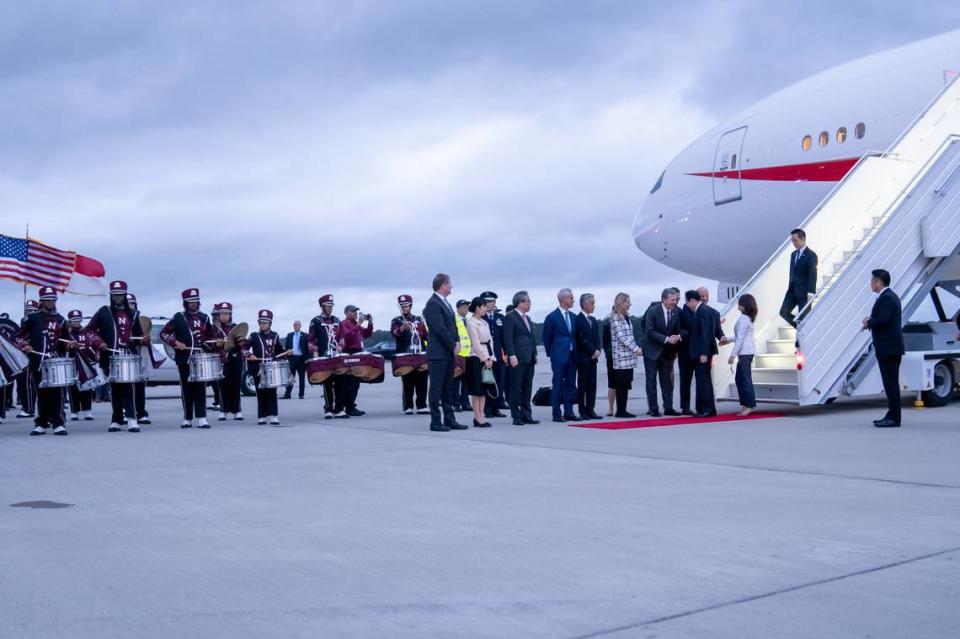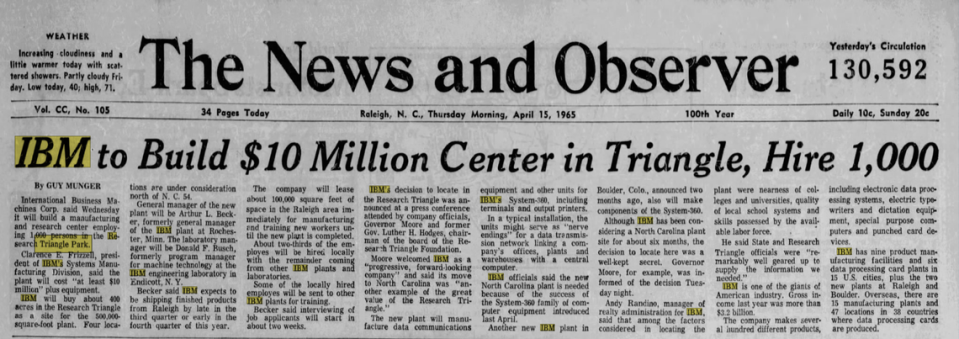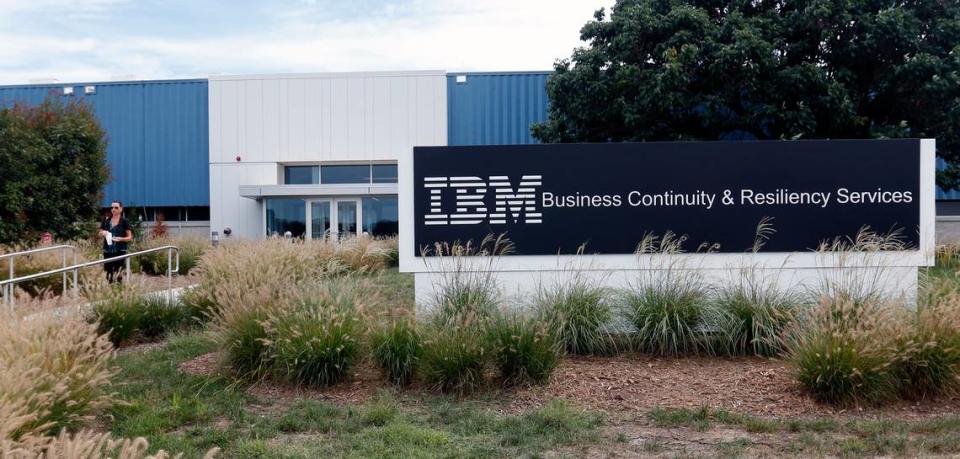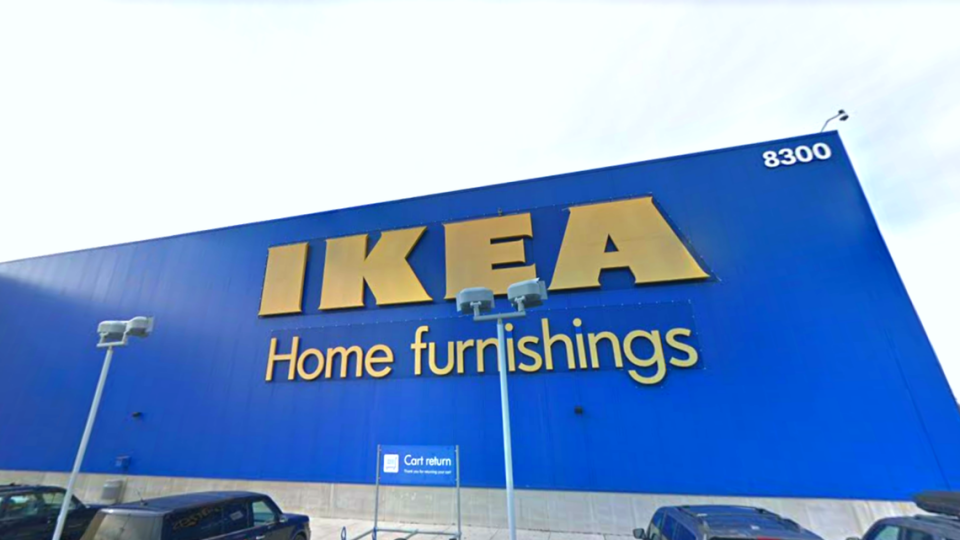Open Source: Gov. Cooper talks lessons from initial Toyota miss and how NC courts Japan
- Oops!Something went wrong.Please try again later.
- Oops!Something went wrong.Please try again later.
I’m Brian Gordon, tech reporter for The News & Observer, and this is Open Source, a weekly newsletter on business, labor and technology in North Carolina.
Around Christmastime in 2017, first-year Gov. Roy Cooper visited Tokyo to lobby Toyota and Mazda to build a joint automobile plant in North Carolina. And the following month, the two Japanese carmakers announced they’d open their new U.S. facility in ... Huntsville, Alabama.
Following this disappointment — despite decades trying, North Carolina still hadn’t landed a major auto manufacturer — Cooper says the state did something Toyota had never seen.
“We asked them to come and to tell us what we could do better,” he said during a phone interview this week. “So over at the governor’s mansion, we had a debrief with the entire Toyota team, asking them questions about what North Carolina needed to do to attract Toyota to our state.”
North Carolina, at the time, was still relatively new at marketing megasites to lure major manufacturers.
Toyota shared it preferred if North Carolina had secured the entire title of its finalist megasite in Randolph County, Cooper explained. Plus, there were multiple utility lines that needed to be removed. Fast-forward to 2021: When Toyota sought a U.S. location for a massive hybrid and electric vehicle battery plant, it selected Randolph County. The site now promises to employ around 5,000 workers in the Piedmont.
“This is an instance where a window closed and a giant door opened,” Cooper said. “We would much rather have this facility which is on the cutting edge of where motor vehicles are going in this country and around the world than to have a regular gas-powered automobile plant.”
Toyota is one of several Japanese companies to zero in on North Carolina during Cooper’s second term. Just yesterday, Fujifilm Diosynth said it will invest another $1.2 billion in its incoming Holly Springs plant, news which came hours before Japanese Prime Minister Fumio Kishida arrived at Raleigh-Durham International Airport for an official visit.
Getting an active foreign head-of-state to North Carolina is rare; Turkish President Celal Bayar’s is believed to be the last to do so, in 1954.
So what’s driving this Japan-North Carolina connection?
I asked Hiroyuki Akiyama, who serves as chief executive director at the Atlanta office of the Japan External Trade Organization, a Japanese government-affiliated group that promotes foreign investments. One thing he mentioned was Japan’s record low birthrate.
“As you realize, the size of Japanese domestic market is forecast to gradually decline because of declining population,” he said in an email. “This factor tends to make Japanese companies seek the opportunities to seek expanding their business overseas in order to keep their profit.”
Akiyama credited Japanese businesses’ specific growth in North Carolina to the state’s growing population, favorable federal policies like the CHIPS Act and Inflation Reduction Act, plus our educated workforce, friendly tax policies, cheap utilities, and a seaport.
So that’s why Japan might like us. But what does North Carolina find appealing about Japanese companies? Cooper identified a common trait.

“I think you have a lot of American companies that are looking to make it big as fast as we possibly can,” he said. “And there’s nothing wrong with that. I think most of the Japanese companies that we have dealt with plan for a long, sustainable future. And they think about planting the trees under which people they may never know will enjoy the shade.”
“Obviously they want to make money,” Cooper continued. “Obviously, they want to make a profit. But that is a cultural distinction that I think is important. One that I think is shared by many American companies, but it’s one that I think is prevailing in Japanese companies.”
Then there are cultural reasons why firms from the East Asian nation might find North Carolina familiar. North Carolina State University houses the NC Japan Center, which Cooper and Kishida will visit Friday. The state opened an economic development office in Japan in the 1970s while the Tokyo-based amino acids producer Ajinomoto has been in the Triangle since 1982.
And Cooper pointed out the country and state each enjoy four seasons and similar climate. Tokyo and Raleigh, in fact, share the exact same latitude: 35 degrees north.
The year IBM brought jobs and a lot of northerners
Monday marks the 59th anniversary of a seminal moment in the history of Research Triangle Park. On April 15, 1965, IBM announced it was coming.
IBM’s decision to open a Triangle campus buttressed the precarious business zone. Founded six years early, RTP initally struggled to land corporate tenants. In 1962, local officials opened a New York City office to convince businesses to move south, The News & Observer reported. This office shuttered within two years after delivering few “tangible results.”
At least RTP was an ideal setting for organized hunting: One 1963 article noted the area’s open nature offered “a good view of hounds at work.”
Then Big Blue arrived, bringing hundreds (and later thousands) of people to the Triangle from its New York State headquarters and other mostly northern states . Though its RTP site wasn’t complete until 1967, IBM had hired immediately throughout 1965 as it leased space in Raleigh and Durham.
In 1966, an N&O reporter noted local first graders got to learn about downhill skiing from their new classmates whose IBM parents had relocated from colder states.

“That announcement was the culmination of seven years of courting by the (Research Triangle Foundation) staff,” writes UNC-Chapel Hill professor William Rohe in his 2011 book “The Research Triangle: From Tobacco Road to Global Prominence.” “IBM’s announcement was seen as a critical vote of confidence, validating the park’s mission and paving the way for the explosive growth that would follow.”
Today, IBM employs several thousand workers in the area — though the company declines to share local headcount figures. According to the state commerce database, it ranks among the Durham County’s top private employers.
“RTP is one of our largest employee sites and the area continues to be a wonderful source of top talent to support our AI and hybrid cloud mission,” IBM’s chief analytics officer Tim Humphrey said in an email statement. “Every function of IBM’s business has a presence in RTP.”
Expect some 60th anniversary commemorations next spring.

The rest of this week’s NC tech headlines
IKEA has 51 stores in the U.S. Here’s why none are in the Triangle.
More on the cultural side of the Japanese Prime Minister’s visit. He will be treated to bluegrass and a lunch from a James Beard Award-winning local chef.
NCInnovation will launch a pilot grant program to help commercialize an initial batch of university research projects. Funding for NCInnovation last year was significant, if controversial.
Today marks the end of Raleigh-Durham Startup Week. The four-day event split its time between Durham and Raleigh. “Founders are at the core of what we want,” RDSW cofounder Archie O’Connor told GrepBeat last Friday. “We want to remove friction. We want to be the front door for founders to be able to come in and get the resources they need.”
And on Wednesday, local serial entrepreneur Scot Wingo released his Triangle Tweener List of local tech startups that generate at least $1 million in annual sales or employ 10 people. Companies graduate off the list when they reach $80 million in revenue or have 500 workers.

National Tech Happenings
Some U.S. companies have asked Taiwan-based AI providers to relocate their operations from China to Mexico given rising U.S.-China tensions.
NASA used Fortnite (created by Cary’s Epic Games) to teach kids about the solar eclipse.
Looking to keep up with Amazon and Microsoft in the AI chips market, Google released its own version of something called an arm-based CPU.
Thank you for reading!

